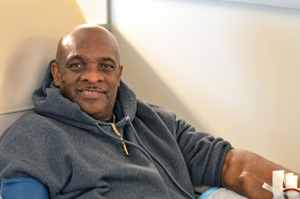Special to The Seattle Medium
When Michael E. Wiley, Sr. found out his kidneys were failing in 2000, he knew he needed to make some serious lifestyle changes.
“I started to control my blood pressure and diet,” said Wiley, an ordained deacon. “These changes allowed me to put off dialysis for more than 10 years.”
On dialysis at Northwest Kidney Centers in Seattle for a year and a half now, Wiley is currently involved in a study led by the Kidney Research Institute, a collaboration between Northwest Kidney Centers and UW Medicine focused on early detection, prevention and treatment of kidney disease.
“I’m always willing to be involved in studies,” said Wiley, 55. “All I do is take a pill every day. It’s painless and really could help.”
The study Wiley is part of aims to find out if certain drugs differ in their long-term effects on cardiovascular events in chronic kidney disease patients undergoing hemodialysis.
“We know there is a link between cardiovascular disease and kidney disease,” said Dr. Jonathan Himmelfarb, director of the Kidney Research Institute. “Because Mr. Wiley and others are willing to take part in this study, we will soon have a better understanding of how certain medications work in preventing cardiovascular problems in dialysis patients with high blood pressure.”
Kidney disease affects 1 in 7 adult Americans and in the African American community, that number increases four-fold.
“Kidney disease is a growing public health concern and, in particular, a concern for the African American community,” said Himmelfarb, also a University of Washington professor of medicine. “African Americans are at a greater risk for not only kidney disease but for end stage renal disease, the final stage of the disease where patients need either dialysis or a transplant to survive.”
Himmelfarb will discuss the latest ways to prevent and treat kidney disease at the free Kidney Health Fest for African American Families, held 9 a.m. to 2 p.m. June 22, 2013, at Van Asselt Elementary (formerly the African American Academy), 8311 Beacon Ave. S., in Seattle. His talk will be in a program that begins at 10 a.m.
“We know the risk factors for kidney disease – high blood pressure, diabetes, obesity – but it often shows no symptoms until it is quite progressed,” said Himmelfarb. “Those at risk need to be screened for kidney disease and the Fest is a great opportunity for people to do this.”
From 9 a.m. to 1 p.m., participants can receive a free kidney health screening which includes a finger stick for a blood sample, urinalysis, blood pressure and weight check.
Northwest Kidney Centers, which puts on the event, has 15 dialysis centers in the Puget Sound area. Most patients who need dialysis undergo the treatment at a center three times a week for three to four hours at a time. Dialysis uses a machine to filter wastes and extra fluid from the bloodstream, acting as a kidney for those whose own kidneys no longer function.
“Dialysis is a life-saving treatment for many people and the shunt – the blood access device that makes hemodialysis possible – was developed at the University of Washington back in the 1960s,” Himmelfarb said. “But since then, not much has changed with the treatment. Through further research, including research on a wearable artificial kidney and a human kidney-on-a-chip, we are working to find new, effective ways to treat those with advanced kidney disease.”
Michael Wiley is praying that research can do just that.
“I’m hoping they find something in the future so people don’t have to go through dialysis,” Wiley said. “But for now, I want to show people life doesn’t end because you have renal disease. Research is one way to give back. It might not help me but it could help others down the road.”
Northwest Kidney Centers invites all members of the community to the Kidney Health Fest to hear more from Dr. Himmelfarb about innovations in kidney research and ways to prevent kidney disease. The event also includes music, entertainment, additional education presentations, a free kidney-healthy lunch, and a variety of activities for kids. To find more, visit www.nwkidney.org/fest.













